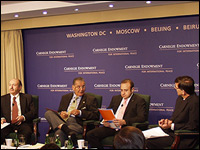Registration
You will receive an email confirming your registration.
IMGXYZ793IMGZYXOn October 11, 2007 the Carnegie Endowment held a panel discussion on Turkey’s strategic identity, American-Turkish relations, and the challenges facing the newly elected Turkish government. The presenters included three leading members of the Turkish Parliament: Egemen Bagis of the Justice and Development Party (AKP), Mustafa Sukru Elekdag of the Republican People’s Party (CHP), and Gunduz Suphi Aktan of the Nationalist Movement Party (MHP). The event was held in Washington, DC and moderated by George Perkovich, Vice President for Studies–Global Security and Economic Development at Carnegie.
The goals of the discussion were to shed light onto how Turkish leaders define their state’s strategic identity in the early 21st century and to identify ways in which U.S. policy facilitates or impedes cooperation with Turkey. The discussion provided analysis and perspective on key questions, including: To what extent do Turkish leaders and citizens see themselves as a bridge between Europe and the Muslim world? What are Ankara’s biggest concerns regarding relations with the United States and security in the Middle East? How could the U.S. Congress’s passage of a resolution on the mass killings of Armenians in the 1915-23 period affect Turkey’s cooperation with the U.S.?
Mr. Bagis began the discussion by describing Turkey as a hub and bridge of cultures, religions, geographies, and international political economies. In recent months, the most important security issue for Ankara has been American inability or unwillingness to cause the Kurdistan Workers Party (PKK) in Iraq to desist from anti-Turkish activities, which Mr. Bagis compared to an Al-Qaeda cell operating in Mexico. However, since the House Foreign Affairs Committee voted and recognized the WWI-era killings of Armenians as genocide, the Armenian issue has become the most important strategic question for Turkey. Mr. Bagis warned that if the House and the Senate vote in favor of the resolution, Turkey will take concrete action against the United States, as Turkish opinion does not differentiate between Congress and the state. In addition, Turkey will not stand by idly on the PKK issue if the United States does not crackdown on the group.
Mr. Elekdag discussed the accomplishments Turkey has achieved in recent decades to transform itself into a secular, pluralistic, Islamic nation. He predicted that Turkey will walk down one of two future paths—either the AKP will allow religious instinct to overcome secularism, or the country will transform itself along democratic lines and become a model in the region. The perception in Turkey is that Washington is engaged in a hidden war with Ankara through support of the PKK, and it is up to Turkey to address the situation. A nuclear-armed Iran would also be a destabilizing force in the region, but the United Nations stands as the best method for preventing such a scenario. In addition, Mr. Elekdag expressed disappointment over the ignorance and quality of debate in Congress on the Armenian issue and urged a legal solution to the problem as stipulated by international law.
In contrast, Mr. Aktan stated that the concept of Turkey as a bridge between cultures is not a useful one. Rather, a clash of civilizations is occurring in Turkey, as the European Union will not accept Turkey as a member because of Islamophobia. Current strategic questions involving the PKK and the debate on the Armenian genocide are exacerbating this polarization between Turkey and the West. Mr. Aktan stated that many people in Turkey would accept a nuclear Iran, in part because of growing mistrust of the U.S. He said that the Armenian question should be addressed through legal processes or arbitration, including referral to the International Court of Justice.
Mr. Perkovich noted that it was unusual and laudatory for leaders of three highly-competitive political parties to sit together on a stage in Washington and engage in constructive give and take with each other and an American audience on contentious issues. He suggested that the quality of deliberation in the U.S. Congress on Turkey indicated that more such interactions and much greater mutual education are necessary given the importance of Turkey to U.S. interests and of U.S. policy to Turkish interests.
In the question and answer session, members of research institutions, the media, and other organizations posed questions on Armenia, the PKK, European Union ascension, and future strategic policies. The speakers reiterated Turkey’s political tolerance of dissent and basic inclination to have constructive relations with the U.S. and Europe. However, they said it was impossible to over-emphasize the importance that the Turkish people, and therefore their elected representatives, place on the need for the U.S. to respect Turkey’s interests regarding the Armenian resolution and action against PKK terrorism. Without this it would be unreasonable to expect Turks to continue their cooperation with the U.S. effort in Iraq and on other important issues.
